- Home
- Ian McDonald
Brasyl (GollanczF.) Page 21
Brasyl (GollanczF.) Read online
Page 21
Robson didn’t do Saturdays, and his replacement edgy- but-inclusive public-facing homosexual with the nickname Lampião was new on the desk and asked Marcelina for her ID. She didn’t bite him in two. She would have need of him later.
The drizzle had steepened into full rain; streaks turned the Glass Menagerie into a strange tech jungle. The Sent Items folder on her workstation confirmed: proposal for Barbosa: Trial of the Century sent to raicariocã[email protected] at 23:32 August fifth. While her alt dot family was singularly failing to comfort her. Proper passwords and logins and everything. Marcelina called up the security page and tabbed the change password button. One by one blobs vanished as she deleted them. New password? Her fingers halted over the keys halfway through mestreginga. She knows you. Every thought every reaction every detail and diary entry of your life. She knows you play capoeira. She knows your shoe size dress size playlists how many bottles of beer are in your fridge what kind of batteries you use in the Rabbit. In the streaming gray Marcelina hugged herself, suddenly chilled. That’s it, isn’t it? You’re in a program within a program; a pilot for an ultimate reality TV show: Make Marcelina Mad. Even now the cameras are swiveling to the direction of some dark control room. They’re all in on it: Celso and Cibelle and Agnetta, the Black Plumed Bird, even Adriano. They were never going to make your show; he just agreed a Blue Sky Friday because it’s part of the script: the clever clever comedy of a program maker who doesn’t realize she’s starring in her own show. The Girl Who Haunted Herself. Lisandra. That cow. She’d do it. She’d do anything to make it to CE. She’s laughing at you right now up in the gallery with a couple of APs and Leandro the editor.
It has to be all just a show. Any other theory is madness.
Marcelina pulled a book at random off her shelf, opened at page 113, typed the 113th word into the pulsing box. Testament. Good word. One unlikely to be stumbled upon at random in Canal Quatro.
Saturday Boy Lampião was SMSing in a blur of thumbs behind his desk.
‘Could you do me a favor?’
His lips pursed in irritation at the interruption to his messaging.
‘Well I don’t know, I mean what if I got into trouble or something?’
‘I know a few people in production.’
He rolled his eyes.
‘Tell me what you want, then.’
‘Were you on last night?’
He shook his head.
‘I need a look at the security footage.’
‘What’s that?’
‘From the cameras.’ She pointed them out like a trolley-dolly indicating the emergency exits. ‘It all goes on to a hundred-gig hard drive. Back there.’ He had been looking in mild panic under his desk. ‘It’s easy enough to download.’
‘I’m not supposed to let anyone round this side of the desk.’
‘It’s for a show.’
‘There should be something in writing about this.’
‘I’ll get it for you on Monday.’
‘I’ll get it for you.’
‘It would be simpler . . .’
He was at the black LaCie drive.
‘How much do you want?’
‘A couple of hours. Say from ten thirty to twelve thirty.’
‘I’ll burn a DVD.’
I’d rather download it onto my PDA, Marcelina was about to say. She bowed in acquiescence. Never underestimate the Brazilian gift for bureaucracy. She watched the rain and the cable cars vanishing into the cloud-cap of the Sugar Loaf. A helicopter buzzed over Dois Irmãos. Not even winter rain could damp down the embers of the recent unrest. A rich hot magma runs beneath our beautiful streets and avenues; we walk, we jog, we exercise our little dogs on its crust, preening and strutting like we are New York or Paris or London until the hidden order breaks through and the woman who cleans your house, cooks your food, cares for your child; the man who drives your taxi, delivers your flowers, fixes your computer is suddenly your enemy and the fire runs down to the sea.
Then she thought, What if a helicopter hit a cable car? Now that’s a CNN moment.
‘There you are. What’s the show?’
‘I’m not supposed to say, but we’re all in it.’
The clouds clung low to the Dois Irmãos and the long ridge of Tijuca, turning Leblon into a bowl of towers, offered to the sea. Hardy boys in toucan-bright neoprene braved the gray-on-gray breakers. In the dash from cab to elevator lobby Marcelina was drenched and shivering. No swirling glissandos of the Queen of the Beija-Flor today. Moisture was bad for the electronics. The cab driver had bought flowers and a surprisingly good bottle of French wine. Most of Canal Quatro’s account drivers were better production assistants than the channel’s own wannabes. Bottle in one hand, flowers - with inscribed card - in the other, Marcelina rode the mirrored box, dripping onto the fake marble floor.
She pressed the doorbell. Behind the chime came a fermata, the opposite of an echo, a silence more sensed than heard of conversations abruptly ending. Canal Quatro had made Marcelina experienced in the subtleties of that silent click. Her mother opened.
‘Oh, so you decided to come, then.’ She pulled away as Marcelina went to kiss her.
They were lined up in neat rows on all the available seating space in her mother’s cramped living room: Gloria and Iracema on the sofa, babies between them, children at their feet caramelly with the sugared treats on the coffee table; husband one perched on the side of an armchair, husband two on a plastic seat brought in from the balcony and wedged between a floor lamp and the organ. A tall glass of vodka stood on a small side table by her mother’s chair. Bubbles rose through the ice cubes, a swizzle-stick with a toucan on the end perched against the edge of the glass. A rich smell of the long-simmered meat and the beans filled the little apartment, the mild acridity of the greens, the fresh top note of the sliced orange. Feijoada had always been celebration to Marcelina. The windows were steamed up.
‘What is this, a jury of my peers?’ Marcelina joked, but the wine felt like a Ronald McDonald mask at a funeral and the flowers the death itself.
‘You’ve got a nerve, I should say,’ Gloria said. Marcelina heard her mother close the door behind her.
The feijoada was now stifling and sickening.
Iracema slid the card across the table. Twin babies in fuzzy-angel fur-suits ascended to heaven amongst hummingbirds and little fluffy clouds. Congratulations: it’s two! Marcelina opened it. . . . I hope you miscarry and lose them, and if you don’t lose them I hope they have Down’s Syndrome . . . Marcelina snapped the card shut. The room wheeled around her. Her family seemed at once removed to cosmological distances and so close she could taste the film on their teeth.
‘You have to know I didn’t write this.’
‘It’s your handwriting.’ Gloria opened the prosecution.
‘It looks like it but—’
‘Who else knew Iracema was expecting twins?’
Gloria’s husband Paulo rose from his perch.
‘Come on, kids, let’s see how the cooking’s getting on.’
‘I did not write that, why would I write that?’
Gloria flipped the card over.
‘Write it out again on the back.’
. . . smug with your perfect kids and perfect husband and you never even suspected that he sees other women. Why do you think he goes to the gym four nights a week . . .
Stroke for stroke. Loop for loop. Scrawl for scrawl.
‘I didn’t write this!’
‘Keep your voice down,’ Marcelina’s mother hissed. ‘You’ve done enough already without the little ones overhearing.’
‘Why would I want to send something like that?’ It was the only question she could ask, but she knew even before she spoke the words it was a fatal one.
‘Because you’re jealous. You’re jealous because we have things you don’t.’ Gloria looked her cold and full, sister to sister eye to eye. And if she had not done that, Marcelina might have been wise, might have apologized and turned around and
walked away. But it was a challenge now, and Marcelina could not be left without the last word.
‘And what could you have that I could possibly be jealous of?’
‘Oh, I think we all know that.’
‘What, your lovely house and your lovely car and your lovely gym membership and lovely medical insurance and lovely lovely kindergarten fees? At least what I have, I earn.’ Marcelina stop it. Marcelina shut up. But she never could. ‘No, no, I’m not the one has the jealousy issues here. I’m not the one still can’t handle the fact that she wasn’t favorite. And that’s always been your problem. You’re the jealous one; I’m the one having a life.’
‘Don’t you dare, dare try and turn this round on me and make it like I’m to blame. I didn’t send that card, and nothing can take away from that.’
‘Well I didn’t either, but I’m not going to try to explain it to you because no one can explain anything to you, you’re always so right and sweet and dandy and everything’s just perfect.’
The hum of voices from the kitchen, bass and piccolo, had fallen silent. You’re hearing right, kids. Your aunt’s a monster. Don’t be expecting any presents until you finish university. I’ll pay for your therapy. Iracema was in tears. Husband João-Carlos had moved from his plastic chair to kneel beside her, caressing her wrist. Fragrant, festive feijoada now revolted her: smell was the great imprinter of memory and it was forever changed. Get out Marcelina, before you slash deeper than any healing. But she turned back from the door to spew, ‘Did any of you even stop to think that maybe something wasn’t right, that maybe there was more to this than just your blind assumption that that’s just Marcelina, isn’t it? Have any of you given even one moment’s thought that maybe something is very, very wrong? Fuck you, I don’t need you, any of you.’
She gave the door as good a slam as she could over an over-springy plastic doormat. The elevator doors closed on a two-dimensional strip of her mother flinging open the door, calling, ‘Marcelina! Marcelina!’ Then she turned to a line, to silence.
The wind had come down from the hills and was carrying away the low, weeping clouds, blowing away the tops of the gray waves. Gulls hovered over the spray line, webs outspread, wings tilting a breath here, a feather there to hold them over the wave tops. Handsome boys in cute rubber suits lounged on the sand and waited for the sky to clear. On the black-and-white patterned sidewalk of Avenida Delfim Moreira Marcelina realized she still had her saturated flowers clutched in her fist. She drew an orchid from the cellophane and launched it at the surfer boys. They laughed and waved. She speared flowers into Leblon’s rain-pocked sand until she had no more. Surf’s up. That noise was back in her head, the whistle of world’s end; tears wrung out of the hollows of her skull.
You said that you said that you said that. But it wasn’t me, it wasn’t me. Then what was it? A reality television show? At her most cruel, most desperate for shock, Marcelina would never have done anything like that card. The family, you never touch the family. But didn’t you do that in Filthy Pigs? Friendships ended, mothers and daughters sundered, families at war?
At the bridge over the canal that drained the lagoon into the ocean, where Leblon ended and Ipanema began, she chewed the plastic seal off the bottle of wine, pushed the cork in with her thumb and swigged down hundred-real imported French Margaux. Cyclists and rollerbladers in wet spandex stared as they whirred past, wheels throwing up narrow wakes of rainwater. Stare at me, stare all you like. She had downed the entire bottle by Arpoador, sent the empty bottle arcing up into the air to smash among the power walkers. Marcelina peeled the saturated hair back from her face to scowl at the staring faces.
‘So? So?’
The brief woo of sirens sent Marcelina down with a wail onto her ass. She sat gaping at the police cruiser as if it had fallen from an angel’s purse. A policewoman helped her to her feet. Rain spilled from the peak of her cap onto Marcelina’s upturned face.
‘You’ve got your pants tucked into your boots,’ Marcelina said.
‘Come on, now. How much have you had?’
‘Only wine officer, only wine.’
‘You should be ashamed of yourself, in public too. Come on, now.’
‘I’m a corda vermelha, you know,’ Marcelina said. ‘I could make you look very very silly.’ But the policewoman’s grip on Marcelina’s elbow was irrefutable. She steered her toward the car. Her partner, a broad-faced mulatinho, shook with laughter.
‘I’m glad you think it’s funny,’ Marcelina said as the policewoman pressed her down into the seat. ‘Oh, I’ve gotten all your upholstery wet.’ She tried to wipe away the drips with her sleeve. ‘Where are you taking me?’
‘Home.’
Marcelina seized the policewoman’s shirt.
‘No, don’t take me there, I can’t go there, she’s there.’
The policewoman quickly and firmly unhooked Marcelina’s fists.
‘Well, you’re in no condition to be out on the street. Would you rather I took you in?’
‘Heitor,’ Marcelina said. ‘Take me to Heitor. Heitoooor!’
He thanked the officers patiently, who were genuinely awed to be in the presence of a television celebrity and delighted at the prospect of profitable gossip. Marcelina sat on the topmost of the terrace steps, runoff from the morro that rose sheer behind Heitor’s apartment block cascading around her.
‘This is going to be all over Quem by Monday,’ Heitor said. There was the discreet exhibitionism of a woman in a sheer playsuit parading under the lenses across the lagoon; that same woman drunk and shrieking on his back steps was quite other thing. ‘Jesus. Are you going to come in? My car’s going to be here in five minutes and I’m going to have to change, this suit is ruined.’
‘Well boo hoo for your suit,’ Marcelina shouted to Heitor’s rain-soaked shoulders as he stepped through the sliding doors into his bedroom. ‘It’s my fucking life that’s over, that’s all.’
Heitor threw a towel out to her. She wrapped it round her head like Carmen Miranda but got to her feet, glitter pumps careful careful on the treacherous waterfall steps and stumbled into the bedroom. Heitor stood in his shorts and socks, knotting a knitted silk tie Marcelina had brought him back from New York. She stood dripping onto his carpet.
‘Do you think it’s like axé, that power can go out and take shapes?
Heitor pulled on his pants, checked the propriety of his creases.
‘What are you talking about?’
Marcelina staggered out of her shoes as Heitor pulled his on with a tortoiseshell shoehorn. Her Capri-cut jeans followed; she fell back onto the bed as she tried to disengage her feet.
‘Like some very strong feelings or stress or wanting something too much can go out of you and gather together and take on a life and body of its own,’ she said. ‘Like the umbanda mestres were supposed to be able to tear off part of their souls and make it take the shape of a dog or a monkey.’
Marcelina put her arms up and slid off the bed out of her saturated strappy top. Her bra followed. Heitor studied her small, tight-nippled breasts in the full-length mirror. He shrugged on his jacket.
‘That’s legend. Magic. Superstition. We live in a scientific, entropic universe.’
‘But suppose suppose suppose . . .’ Marcelina said in her tanga. The intercom buzzed. Taxi. Heitor kissed her, circled his thumbs over her nipples. Marcelina pressed close, tried to slip the tongue. Heitor gently pressed her down to the bed.
‘I’ll see you in there later. And do try and get some water down you.’
‘Heitor!’
The rain streaking across the coffin-narrow concrete garden was now stained ochre with eroded soil. Marcelina sat up under the sheet, knees pulled to chin, watching the morro wash between the potted plants and down the steps, shivering at the horror. Sleep was impossible. She scuffed around on Heitor’s polished hardwood floor in her bare feet, looking for water. Marcelina slowly bent over and bared her ass to the telescopes across the lagoon. Wipe your lenses,
boys and girls. She slapped her backside.
But she had still wished her own sister’s twin babies aborted in the womb.
Marcelina flicked on the plasma screen. Noise, chatter, brainpan jabber. Stop you thinking about yourself. And there was Heitor, the remote control camera moving in for a close-up as the title graphics rolled. The headlines tonight. Burning cars, police helicopters, corpses in Bermudas. The walls around the favelas another course of bricks taller. Lula rocked by fresh corruption allegations. Brazil, the nation of the future. Then Marcelina saw Heitor scan the next line on the autocue and his eyes widen. There was the tiniest of pauses. Heitor never did that. Heitor was the old-school public-service commitment to the Truth Well Told in a jungle of eighteen-to-thirty-four demographics and noisy edginess. Heitor was professional down to the shine of his shoes. All her attention was focused on the screen.

 Empire Dreams
Empire Dreams The Menace from Farside
The Menace from Farside Luna: Moon Rising
Luna: Moon Rising Moon Rising
Moon Rising Desolation Road dru-1
Desolation Road dru-1 Empress of the Sun
Empress of the Sun Ares Express dru-2
Ares Express dru-2 Tendeléo’s Story
Tendeléo’s Story River Of Gods
River Of Gods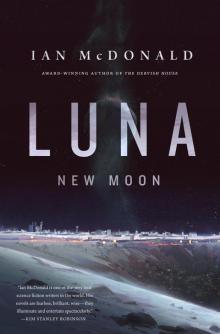 Luna
Luna![Cyberabad Days - [River of Gods 02] Read online](http://i1.bookreadfree.com/i1/03/29/cyberabad_days_-_river_of_gods_02_preview.jpg) Cyberabad Days - [River of Gods 02]
Cyberabad Days - [River of Gods 02]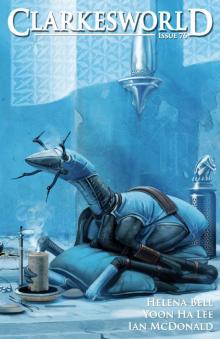 Clarkesworld Magazine Issue 76
Clarkesworld Magazine Issue 76 Brasyl (GollanczF.)
Brasyl (GollanczF.) Scissors Cut Paper Wrap Stone
Scissors Cut Paper Wrap Stone Chaga
Chaga Time Was
Time Was Cyberabad Days
Cyberabad Days Be My Enemy
Be My Enemy Changa
Changa King of Morning, Queen of Day
King of Morning, Queen of Day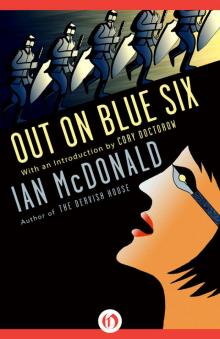 Out on Blue Six
Out on Blue Six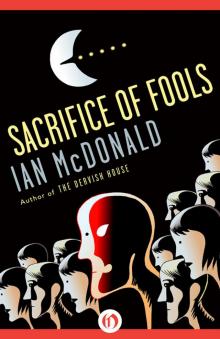 Sacrifice of Fools
Sacrifice of Fools Desolation Road
Desolation Road Luna--Wolf Moon--A Novel
Luna--Wolf Moon--A Novel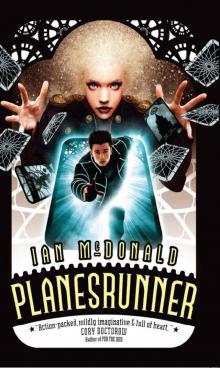 Planesrunner (Everness Book One)
Planesrunner (Everness Book One) Ares Express
Ares Express